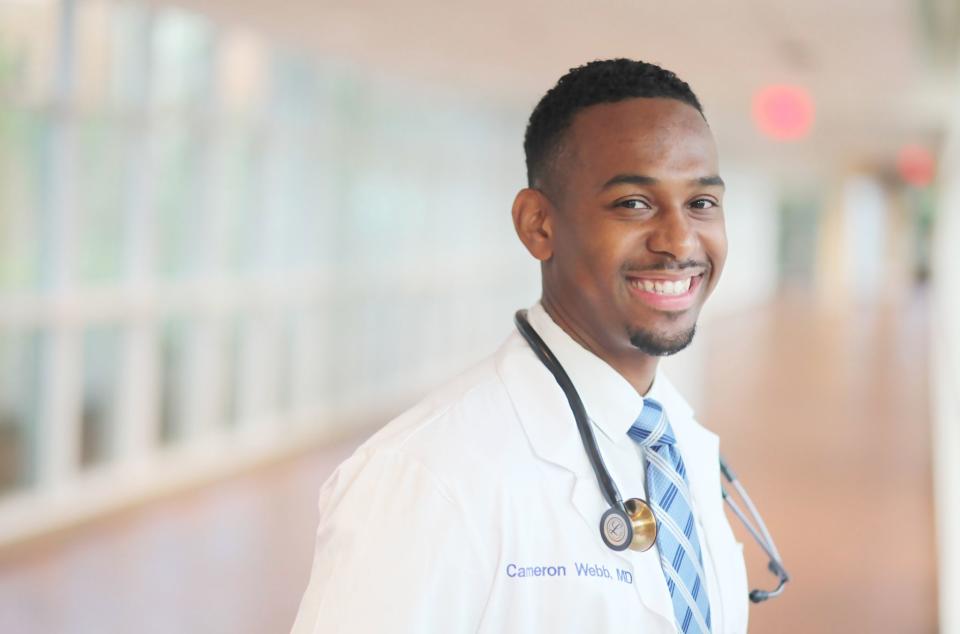Virginia Democrats Could Elect The First Black Physician To Congress

Virginia’s largest district has been a Republican stronghold for a decade. But intraparty tensions and fallout over the coronavirus pandemic could finally break the GOP streak.
One of the four candidates vying for the Democratic nomination on June 23 to replace outgoing Rep. Denver Riggleman in the Old Dominion’s 5th Congressional District seems uniquely tailored for the times: He’s Black, he’s a doctor and he’s thrusting health care to the forefront of the election.
Dr. Cameron Webb is a fresh-faced, 36-year-old doctor from Charlottesville who could go down in history as the first Black physician elected to a full-fledged spot in Congress. It’s a prospect that carries particular weight now as Black communities are facing the worst of the coronavirus outbreak and as President Donald Trump works to undermine medical experts’ advice on how to stop the virus.
“Now more than ever we need leadership to fix our health care system, and I realized there’s a role for me to play here,” Webb told HuffPost. “I say this all the time: This is the health care election, unlike any that I’ve seen before.”
The record number of unemployed Americans means that people are being dropped from their employer’s health insurance plans at a time when access to care is more critical than ever, Webb said. It’s a crisis that could make his pitch for uncoupling health insurance from jobs potentially attractive to voters — even to the district’s mostly rural, conservative-leaning ones.
“This is that moment for us to break that connection between employment and health insurance,” he added. “I call that the original sin of American health care.”
But Webb still supports a private option, putting him more in line with presumptive Democratic presidential nominee Joe Biden than Sen. Bernie Sanders (I-Vt.), the former vice president’s erstwhile rival and ideological opponent.
Over the past few years, Sanders and the Democratic Party’s resurgent left wing have popularized “Medicare for All,” a single-payer government program that would all but abolish private health insurance.
Webb takes a more conservative approach that aims to “fix private insurance so we’re putting people over profits,” he told The Roanoke Times in May. His platform calls for a model that encourages employers to contribute to health insurance costs for workers but allows employees to choose between a public or private plan.
He doesn’t sugarcoat the question that dogs most Democratic candidates seeking to reform health care: It’ll raise costs.
“It does increase the costs to have 100% of Americans covered,” Webb said. “But if everyone could have access, everybody would have had access to [COVID-19] testing.”
Webb is also campaigning on mainstay Democratic issues. On climate change, he backs a 100% renewable electricity standard, a position that directly challenges Dominion Energy, a powerful fossil-fueled utility company in Virginia and a kingmaker in state politics. He also supports ending the cash bail system nationwide and legalizing marijuana.
There’s no public polling data on the 5th Congressional District race, but Webb has racked up a suite of endorsements from national party heavyweights, including California Sen. Kamala Harris and New York Rep. Hakeem Jeffries. He has also won the backing of 314 Action, the science-based political action committee. His primary opponents include Roger Dean Huffstetler, a tech startup founder, Marine Corps veteran Claire Russo and John Lesinski, a commercial real estate executive.
Webb, who is the Director of Health Policy and Equity at the University of Virginia School of Medicine, has been on the front lines of the pandemic treating COVID-19 patients as he juggles being a father, husband and political candidate. He would be the first Black physician elected to Congress from a state. (Delegate Donna Christensen, a Black physician from the Virgin Islands, served in Congress until 2015 but did not have voting powers.)
The Spotsylvania, Virginia, native received his medical and law degrees, and his wife, Dr. Leigh Ann Webb, is a practicing emergency room doctor. He credits his time as a White House fellow — having been tapped by President Barack Obama to work on the White House Health Care Team and My Brother’s Keeper Initiative — with helping him to recognize the importance of policymaking in shaping health care.
“Seeing that pendulum swing from Obama to Trump made me realize how powerful the space of the government was and impacted health access and outcomes,” Webb said. “Health doesn’t happen inside of hospitals or in clinics. It truly does happen in communities.”

Virginia’s 5th Congressional District is a sprawling one, spanning from the southernmost border of North Carolina to outside Washington, D.C. Low voter turnout for next Tuesday’s primary, which Gov. Ralph Northam delayed by two weeks, is to be expected because of COVID-19. Although the district is rated R+6 on the Cook Partisan Voting Index, a polling-based measure of the jurisdiction’s party-leaning tendencies, the chances of a Democratic candidate capturing this historically right-leaning area is not far out of reach.
The last Democratic candidate to be elected was Tom Perriello in 2008, as support for Obama that year led to a higher Black voter turnout in the district. Perriello held the seat until 2010, when Republican Robert Hurt won in the wave of GOP midterm victories. Riggleman won in 2018. And while two of Virginia’s five pivot counties are located in the district — ones that voted for Obama in 2008 and then Trump in 2016 — Democrats like Webb could benefit from another wave of support for Biden this November.
Those chances are also looking increasingly likely since the incumbent Riggleman lost the party’s nomination on Saturday to Bob Good, a born-again Christian and former official at the Evangelical school Liberty University. Despite an endorsement from Trump, who hailed him as a “true conservative leader,” Riggleman faced backlash from local party members who opposed a same-sex wedding he had officiated.
Webb said Riggleman’s record on health care has also left a gap.
“When Riggleman ran in 2018, he ran as a moderate on health care and said he was going to protect the Affordable Care Act and build upon it,” Webb said. “But instead, what he’s done is he’s voted against protecting people with preexisting conditions and voted against reducing the cost of prescription drugs.”
“He hasn’t done anything meaningful to help improve access or affordability to health care,” he added. “That’s why people are inclined to find leadership elsewhere.”
While Webb’s vision for health care might lean more moderate, the candidate said he is open to a single-payer system in the future.
“We’re going to show people how strong a public plan can be, how effective it can be, how comprehensive it can be, and we’ll see if the private market competes and is able to keep up,” Webb said. “And if it doesn’t, then we keep moving.”
Love HuffPost? Become a founding member of HuffPost Plus today.
This article originally appeared on HuffPost.

